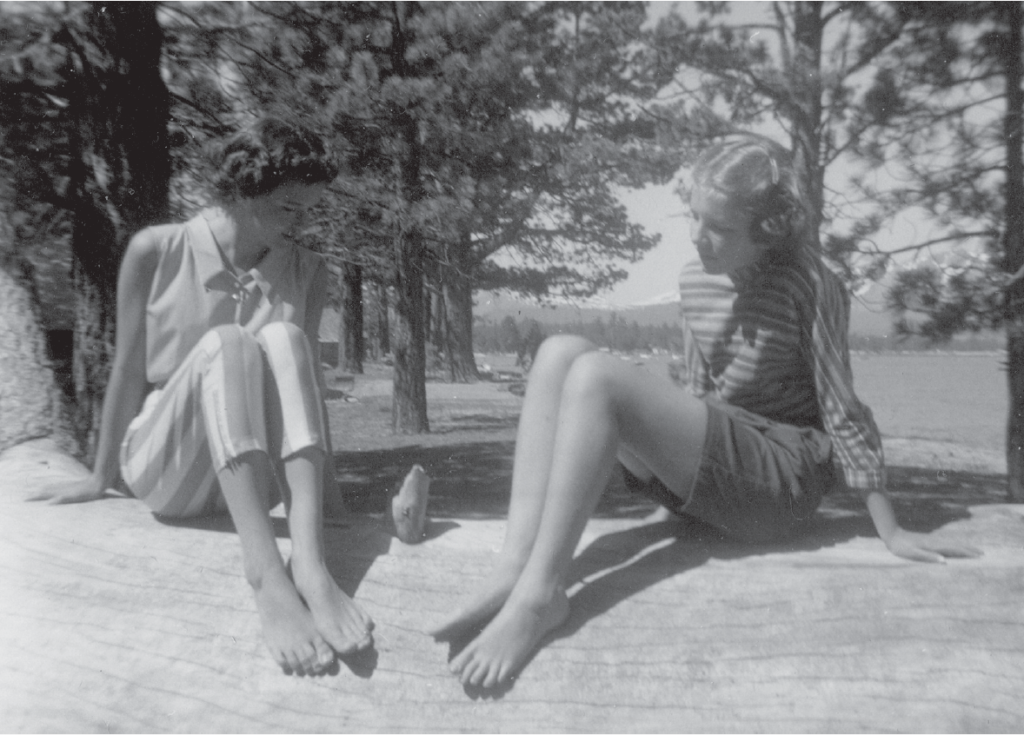
Sharon Olds at left, with a GIrl Scout camp friend at Lake Tahoe, California, ca. 1956. Courtesy of Sharon Olds.
Who is Sharon Olds? Sharon Olds is an American poet, born in San Francisco in 1942. She has a Ph.D. in English from Columbia University and made her debut as a writer in 1980 with the poetry collection Satan Says. Since then, she has established herself as one of the most read, most decorated, and most controversial North American contemporary poets. “Sharon Olds’s poems are pure fire in the hands,” Michael Ondaatje has said. She became particularly well known after she refused to take part in a National Book Festival dinner organized by Laura Bush, then First Lady, in 2005, and wrote in an open letter: “So many Americans who had felt pride in our country now feel anguish and shame, for the current regime of blood, wounds and fire. I thought of the clean linens at your table, the shining knives and the flames of the candles, and I could not stomach it.”
The way I discovered her was through a poem on a particular penis, which came as a recommendation from a Finnish Swedish colleague: “Read Sharon Olds’s ‘The Pope’s Penis’!” How reading this little poem about the Pope’s sexual organ became contagious, I don’t know, but the fact is that at almost the same time, I got a text message from another colleague, who wrote that she was sitting in a waiting room somewhere reading Sharon Olds’s “The Pope’s Penis.” And here I must grab hold of you, reader, and shout, as though by international chain letter: Read Sharon Olds’s “The Pope’s Penis”! Let’s quote it in its entirety:
It hangs deep in his robes, a delicate
clapper at the center of a bell.
It moves when he moves, a ghostly fish in a
halo of silver seaweed, the hair
swaying in the dark and the heat—and at night
while his eyes sleep, it stands up
in praise of God.
The poem is an introduction to certain motifs—the body, darkness, the desire to confront, imagery, et cetera—which often appear in other equally unsettling, gripping variations and combinations elsewhere in her poetry. For example, here, in this extract from “Self-Portrait, Rear View,” in which the poem’s narrator is standing in a hotel room and, in another mirror and another light, catches sight of her fifty-four-year-old backside, “once a tight end”:
I flutter
the wing of my ass again, and see,
in a clutch of eggs, each egg,
on its own, as if shell-less, shudder, I wonder
if anyone has ever died,
looking in a mirror, of horror.
It is in part the directness and mercilessness of her texts that have made her controversial. Does she exploit her own family for poetic purposes? Does she unjustly expose her parents and children? Perhaps it is the heartbreaking quality of her poems that has both won her so many prizes and afforded her poems the opportunity to appear in Oprah Winfrey’s magazine, alongside articles with titles such as “5 (Doable) Ways to Increase the Love in Your Life.” She herself says in an interview with Salon that the reason she is able to touch so many people is that she is not an “abstract thinker.” She is concerned with the day-to-day, with life, with looking at it, with letting observations and feelings flow down her arm and out through her pen, onto the paper. It’s life that is important, and these poems help you to see that.
It’s also true that life would not have been the same without these poems. Sharon Olds is one of the most powerful examples to show that cautious writers who don’t dare to write what they really want to, for fear of reprisals, are not what we need. In “The Sisters of Sexual Treasure,” she writes:
As soon as my sister and I got out of our
mother’s house, all we wanted to
do was fuck, obliterate
her tiny, sparrow body and narrow
grasshopper legs.
Personal, offensive poems? She says herself, in interviews, that she prefers the description “apparently personal.” “I have never said that the poems don’t draw on personal experience,” she says. “But I’ve never said that they do.” It’s a paradox: the words apparently and personal are obviously contradictory: personal indicates that we are being drawn into someone’s intimate sphere, having secrets whispered in our ear; apparently in this context suggests “false, not genuine, pretend”—something looks personal, but do we have proof? Does it annoy us, to feel that it’s only “apparent” that Olds’s poems are personal—that is to say, coming from a real person? Does not the word also have something magical about it—”to make something appear, become visible”? Is that how it can be read? That the personal appears? I would like to say yes! But we can’t be certain that what we discover is Sharon Olds’s personal. It could just as easily be our own. Perhaps we will never know. We only feel it, as a slight pressure on the solar plexus, as a boom in our heart, as a sudden lift out of our own good skin.
Translated from the Norwegian by Kari Dickson.
Gunnhild Øyehaug is an award-winning Norwegian poet, essayist, and fiction writer. Her most recent book is Evil Flowers. Øyehaug lives in Bergen, where she teaches creative writing.
Kari Dickson is an award-winning literary translator from Norwegian into English.
from The Paris Review https://ift.tt/TNiIwM9
Comments
Post a Comment